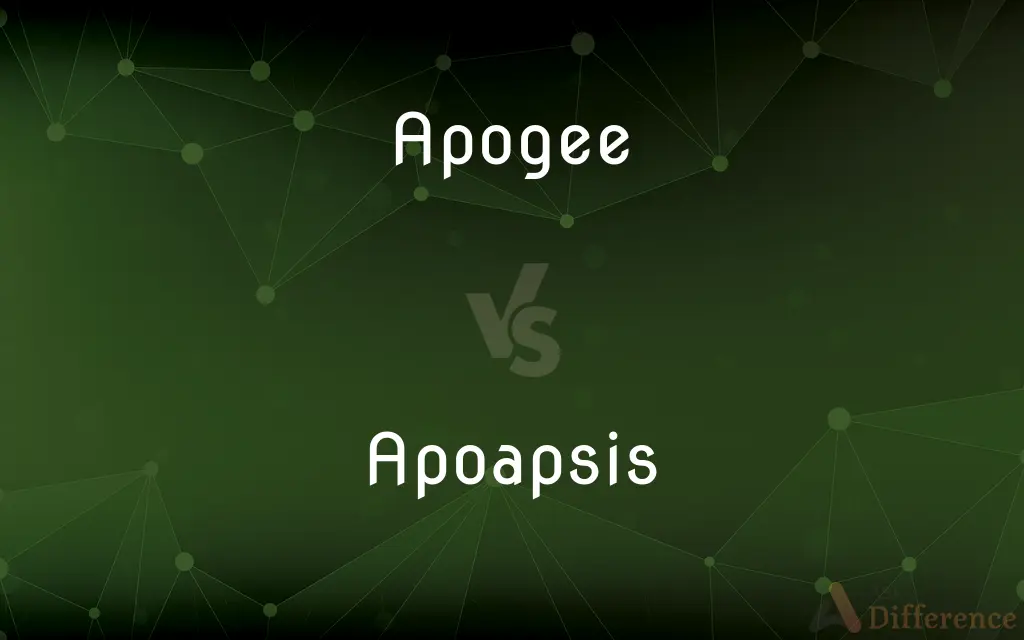Apogee vs. Apoapsis — What's the Difference?
By Fiza Rafique & Maham Liaqat — Updated on April 23, 2024
Apogee specifically refers to the farthest point in the orbit of an object around Earth, whereas apoapsis is the farthest point in the orbit around any celestial body.

Difference Between Apogee and Apoapsis
Table of Contents
ADVERTISEMENT
Key Differences
Apogee is a term used specifically when discussing objects orbiting Earth, denoting the point at which they are furthest from the Earth's surface. Whereas apoapsis is a more general term that refers to the farthest point in an orbit around any celestial body, such as a planet, the sun, or a moon.
The concept of apogee is particularly relevant in contexts involving satellites, the moon, or other objects that orbit Earth specifically. On the other hand, apoapsis is used in a broader range of astronomical contexts, applicable to any orbital body in the universe.
When discussing satellite orbits specifically around Earth, the term apogee is preferred. In contrast, discussing orbits around bodies like Mars or the Sun would involve the term apoapsis, with specific terms like aphelion for the Sun.
In orbital mechanics, the apogee is an important consideration for calculating the satellite's exposure to radiation and its visibility from Earth. Apoapsis, regardless of which body it refers to, plays a crucial role in understanding the orbit's eccentricity and energy dynamics.
Apogee and apoapsis both derive from Greek roots with 'apo-' meaning away and '-gee' relating specifically to Earth in apogee, while '-apsis' means orbit or arch, indicating a generic usage applicable to any celestial body.
ADVERTISEMENT
Comparison Chart
Definition
Farthest point from Earth in an orbit
Farthest point from a celestial body in an orbit
Specificity
Specific to Earth
Applicable to any celestial body
Common Usage
Satellites, moon orbiting Earth
Planetary orbits, comets, other celestial orbits
Related Terms
Perigee (closest point to Earth)
Periapsis (closest point to a celestial body)
Importance
Key in Earth orbit mechanics
Key in general orbital mechanics
Compare with Definitions
Apogee
The point in the orbit of a moon or a satellite at which it is farthest from the Earth.
The satellite reached its apogee, the farthest distance from Earth, three hours after launch.
Apoapsis
The farthest or highest point in any orbit.
The comet's apoapsis takes it beyond the orbit of Jupiter.
Apogee
A culminating point in space relative to Earth.
The apogee of the moon's orbit varies slightly each month.
Apoapsis
The point in an orbit most distant from the body being orbited.
At apoapsis, the spacecraft will take photos of the planet.
Apogee
The highest point in development.
His career reached its apogee in the 2000s.
Apoapsis
Related to the concept of orbital mechanics.
Adjusting the apoapsis requires careful maneuvering.
Apogee
A climax or peak of an abstract aspect.
The apogee of the performance was its stunning finale.
Apoapsis
A point in space denoting the peak of an orbital path.
Calculating the exact apoapsis helps in understanding orbital decay.
Apogee
The point in an elliptical orbit around Earth farthest from the center of the Earth.
The mission planned to take measurements at the apogee of the orbit.
Apoapsis
Used in the context of any celestial body's orbit.
The satellite's apoapsis in Mars orbit is crucial for data collection.
Apogee
(Astronomy)The point in an orbit around the planet Earth where the orbiting body is farthest from the planet.
Apoapsis
The point at which an orbiting object is farthest away from the center of mass of the body it is orbiting.
Apogee
The analogous point in an orbit around a celestial body other than Earth. Not in technical use.
Apoapsis
(astronomy) The point of a body's elliptical orbit about the system's centre of mass where the distance between the body and the centre of mass is at its maximum.
Apogee
The farthest or highest point; the apex:"The golden age of American sail, which began with the fast clipper ships in 1848, reached its apogee in the Gold Rush years"(Los Angeles Times).
Apoapsis
(astronomy) the point in an orbit farthest from the body being orbited
Apogee
(astronomy) The point, in an orbit about the Earth, that is farthest from the Earth: the apoapsis of an Earth orbiter.
Apogee
The point, in an orbit about any planet, that is farthest from the planet: the apoapsis of any satellite.
Apogee
The point, in any trajectory of an object in space, where it is farthest from the Earth.
Apogee
(figuratively) The highest point.
Apogee
That point in the orbit of the moon which is at the greatest distance from the earth.
Apogee
Fig.: The farthest or highest point; culmination.
Apogee
A final climactic stage;
Their achievements stand as a culmination of centuries of development
Apogee
Apoapsis in Earth orbit; the point in its orbit where a satellite is at the greatest distance from the Earth
Common Curiosities
How do you calculate apogee?
Apogee is calculated based on the distance from the center of Earth to the orbiting object at its farthest point.
Is apoapsis relevant to all types of orbits?
Yes, apoapsis is a general term applicable to any orbital path, regardless of the celestial body.
Can apogee be used for orbits around other planets?
No, apogee is exclusive to Earth; other celestial bodies have specific terms like aphelion for the Sun.
What factors influence changes in apoapsis?
Gravitational forces, orbital velocity, and external forces like thrust can influence changes in apoapsis.
How does knowing the apoapsis benefit space missions?
Knowing the apoapsis helps in planning mission trajectories, fuel needs, and communication strategies.
What is the main difference between apogee and apoapsis?
Apogee is specifically the highest point in an orbit around Earth, while apoapsis refers to the highest point around any celestial body.
What tools are used to measure apogee?
Telemetry, radar, and laser ranging are tools commonly used to measure apogee.
Can the apogee of an orbit change over time?
Yes, influences like gravitational pulls from other celestial bodies can alter an orbit's apogee over time.
Does apoapsis affect the duration of an orbit?
Yes, the higher the apoapsis, the longer the orbital period, due to the larger path the object must travel.
Why is apogee important for satellite communication?
Understanding apogee helps optimize communication when satellites are farthest from Earth, affecting signal strength.
Share Your Discovery

Previous Comparison
Fiscal vs. Attorney
Next Comparison
Slag vs. ShagAuthor Spotlight
Written by
Fiza RafiqueFiza Rafique is a skilled content writer at AskDifference.com, where she meticulously refines and enhances written pieces. Drawing from her vast editorial expertise, Fiza ensures clarity, accuracy, and precision in every article. Passionate about language, she continually seeks to elevate the quality of content for readers worldwide.
Co-written by
Maham Liaqat













































